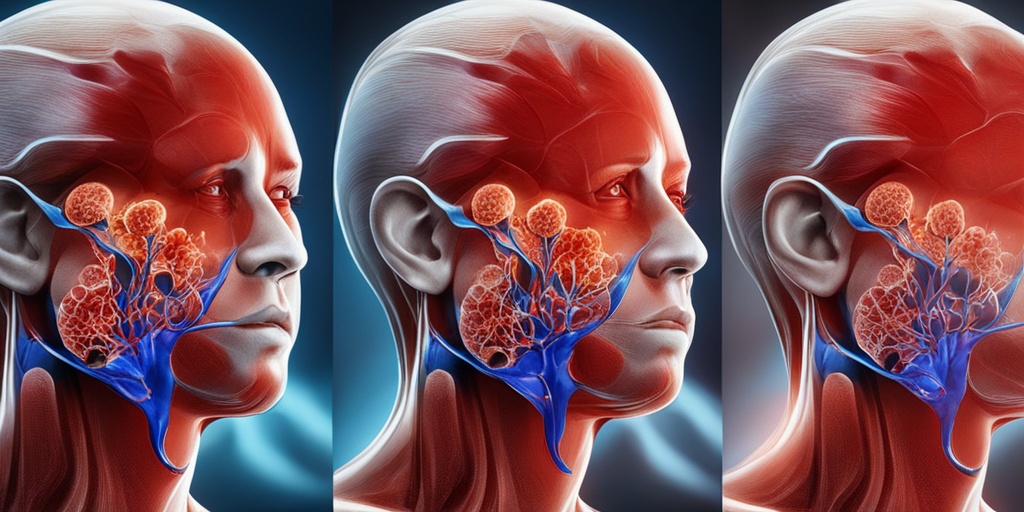What Are Lymph Nodes?
Lymph nodes are small, bean-shaped organs that play a vital role in our immune system. They are part of the lymphatic system, which helps to defend our body against infection and disease. There are hundreds of lymph nodes located throughout our body, with clusters found in the neck, armpits, groin, and behind the ears.
Lymph nodes act as filters, trapping foreign substances like bacteria, viruses, and other toxins that enter our body. They contain immune cells called lymphocytes, which help to fight infection and destroy harmful substances. When lymph nodes detect the presence of an invader, they can become swollen as they work to eliminate the threat.
In a healthy individual, lymph nodes are usually small and not easily felt. However, when they become enlarged or swollen, it can be a sign that our body is fighting an infection or reacting to an allergen or irritant.
What Causes Swollen Lymph Nodes?
Swollen lymph nodes, also known as lymphadenopathy, can occur for a variety of reasons. In most cases, swollen lymph nodes are a sign that our body is fighting an infection or reacting to an allergen or irritant. Here are some common causes of swollen lymph nodes:
Infections
Bacterial infections, such as strep throat or a skin infection, can cause swollen lymph nodes in the neck or armpits. Viral infections, like the common cold or flu, can also lead to swollen lymph nodes in the neck or groin.
Immune System Disorders
Autoimmune disorders, such as rheumatoid arthritis or lupus, can cause swollen lymph nodes as the immune system mistakenly attacks healthy tissues.
Cancer
In rare cases, swollen lymph nodes can be a sign of cancer, such as lymphoma or leukemia. This is why it’s essential to consult a healthcare professional if you experience persistent or severe swollen lymph nodes.
Allergies and Irritants
Allergies to substances like pollen, dust, or certain foods can cause swollen lymph nodes. Exposure to irritants, such as chemicals or heavy metals, can also lead to swollen lymph nodes.
If you’re experiencing swollen lymph nodes, it’s essential to consult a healthcare professional to determine the underlying cause. In the meantime, you can use online resources like Yesil Health AI to find evidence-based health answers and learn more about swollen lymph nodes. 🤕
Remember, swollen lymph nodes can be a sign of an underlying infection or condition. If you’re experiencing persistent or severe symptoms, don’t hesitate to seek medical attention. 💊

Swollen Lymph Nodes Symptoms
Have you ever noticed a lump or swelling in your neck, armpit, or groin area? 🤕 It could be a sign of swollen lymph nodes! Lymph nodes are an essential part of our immune system, and when they become inflamed or infected, they can cause a range of symptoms. In this article, we’ll explore the common symptoms of swollen lymph nodes and what they might indicate.
What Do Swollen Lymph Nodes Feel Like?
Swollen lymph nodes can feel like small, tender lumps or bumps under the skin. They may be soft and moveable or firm and fixed in place. In some cases, they can be painful to the touch or even cause discomfort when you move your body. 🤕
Common Symptoms of Swollen Lymph Nodes
Here are some common symptoms of swollen lymph nodes:
- Fever: A high temperature can indicate an infection or inflammation in the lymph nodes.
- Pain or tenderness: Swollen lymph nodes can be painful or tender to the touch.
- Swelling: Enlarged lymph nodes can cause visible swelling in the affected area.
- Redness or warmth: The skin over the swollen lymph node may become red, warm, or inflamed.
- Fatigue: Swollen lymph nodes can be a sign of an underlying infection or illness, leading to feelings of exhaustion.
- Loss of appetite: Some people may experience a decrease in appetite due to swollen lymph nodes.
Swollen Lymph Nodes in Neck
Swollen lymph nodes in the neck are a common occurrence, especially in response to infections or inflammation in the head and neck region. 🤧
Causes of Swollen Lymph Nodes in Neck
Here are some possible causes of swollen lymph nodes in the neck:
- Upper respiratory infections: Colds, flu, and sinus infections can cause swollen lymph nodes in the neck.
- Mononucleosis (mono): This viral infection can cause swollen lymph nodes in the neck and other areas.
- Strep throat: Bacterial infections like strep throat can lead to swollen lymph nodes in the neck.
- Dental infections: Abscesses or infections in the teeth or gums can cause swollen lymph nodes in the neck.
- Cancer: In rare cases, swollen lymph nodes in the neck can be a sign of cancer, such as lymphoma.
It’s essential to consult a healthcare professional if you’re experiencing swollen lymph nodes in your neck or any other area. They can help determine the underlying cause and provide appropriate treatment. 💊

Swollen Lymph Nodes in Armpit
Have you noticed a lump or swelling in your armpit area? 🤕 It can be a cause for concern, especially if you’re not sure what’s causing it. One possible explanation is swollen lymph nodes in the armpit. In this article, we’ll explore the reasons behind this condition, its symptoms, and what you can do about it.
What are Lymph Nodes?
Before we dive into the specifics of swollen lymph nodes in the armpit, let’s quickly cover what lymph nodes are. Lymph nodes are small, bean-shaped organs that play a crucial role in our immune system. They’re located throughout our body, including in the armpits, neck, groin, and behind the ears. Lymph nodes act as filters, trapping foreign substances like bacteria, viruses, and other toxins, and helping to remove them from our body.
Causes of Swollen Lymph Nodes in Armpit
So, what causes swollen lymph nodes in the armpit? There are several possible reasons, including:
- Infections: Bacterial or viral infections, such as the common cold or flu, can cause swollen lymph nodes in the armpit.
- Cancer: In rare cases, swollen lymph nodes in the armpit can be a sign of cancer, such as breast cancer or lymphoma.
- Vaccinations: Some vaccinations, like the HPV vaccine, can cause swollen lymph nodes in the armpit as a side effect.
- Allergic reactions: Allergic reactions to certain substances, like insect bites or medications, can lead to swollen lymph nodes in the armpit.
Symptoms of Swollen Lymph Nodes in Armpit
So, how do you know if you have swollen lymph nodes in your armpit? Some common symptoms include:
- Pain or tenderness: You may experience pain or tenderness in the armpit area, especially when moving your arm or applying pressure.
- Swelling: You may notice a lump or swelling in the armpit area, which can be tender to the touch.
- Redness and warmth: The skin in the armpit area may become red, warm, or inflamed.
Swollen Lymph Nodes in Groin
Swollen lymph nodes in the groin area can be just as concerning as those in the armpit. The groin area is home to a group of lymph nodes called the inguinal lymph nodes, which can become swollen due to various reasons.
Causes of Swollen Lymph Nodes in Groin
Some possible causes of swollen lymph nodes in the groin area include:
- Infections: Infections like sexually transmitted infections (STIs), urinary tract infections (UTIs), or skin infections can cause swollen lymph nodes in the groin.
- Cancer: In rare cases, swollen lymph nodes in the groin can be a sign of cancer, such as testicular cancer or lymphoma.
- Injury or trauma: A groin injury or trauma can cause swollen lymph nodes in the area.
Symptoms of Swollen Lymph Nodes in Groin
The symptoms of swollen lymph nodes in the groin area are similar to those in the armpit, including:
- Pain or tenderness: You may experience pain or tenderness in the groin area, especially when moving your leg or applying pressure.
- Swelling: You may notice a lump or swelling in the groin area, which can be tender to the touch.
- Redness and warmth: The skin in the groin area may become red, warm, or inflamed.
Remember, if you’re experiencing swollen lymph nodes in your armpit or groin area, it’s essential to consult with a healthcare professional to determine the underlying cause and appropriate treatment. 🏥

Diagnosing Swollen Lymph Nodes
Swollen lymph nodes can be a cause for concern, and it’s essential to get an accurate diagnosis to determine the underlying cause. In this section, we’ll explore the steps involved in diagnosing swollen lymph nodes.
Physical Examination
The first step in diagnosing swollen lymph nodes is a physical examination by a healthcare professional. During the examination, the doctor will typically:
- Feel the affected area to check for tenderness, size, and texture of the lymph nodes
- Check for any signs of infection, such as redness, warmth, or swelling
- Examine the surrounding skin for any rashes or lesions
Medical History
The doctor will also ask questions about your medical history, including:
- Any recent illnesses or infections
- Any medications you’re currently taking
- Any travel history or exposure to infectious diseases
Diagnostic Tests
Depending on the results of the physical examination and medical history, the doctor may order diagnostic tests to help identify the underlying cause of the swollen lymph nodes. These tests may include:
- Blood tests to check for infection or inflammation
- Imaging tests, such as ultrasound, CT, or MRI scans, to visualize the lymph nodes
- Biopsy to examine a sample of the affected lymph node tissue
Common Causes of Swollen Lymph Nodes
Swollen lymph nodes can be caused by a variety of factors, including:
- Infections, such as bacterial, viral, or fungal infections
- Cancer, such as lymphoma or leukemia
- Autoimmune disorders, such as rheumatoid arthritis or lupus
- Inflammatory conditions, such as sinusitis or tonsillitis
It’s essential to get an accurate diagnosis to determine the underlying cause of the swollen lymph nodes and develop an effective treatment plan.
Treatment for Swollen Lymph Nodes
The treatment for swollen lymph nodes depends on the underlying cause. In this section, we’ll explore the various treatment options available.
Treating the Underlying Cause
If the swollen lymph nodes are caused by an infection, the doctor may prescribe:
- Antibiotics to treat bacterial infections
- Antiviral medications to treat viral infections
- Antifungal medications to treat fungal infections
If the swollen lymph nodes are caused by cancer, the treatment may involve:
- Chemotherapy to kill cancer cells
- Radiation therapy to shrink tumors
- Surgery to remove affected lymph nodes or tumors
Relieving Symptoms
In addition to treating the underlying cause, the doctor may recommend the following to relieve symptoms:
- Over-the-counter pain relievers, such as acetaminophen or ibuprofen, to reduce pain and inflammation
- Warm compresses to reduce swelling and relieve discomfort
- Rest and relaxation to help the body recover
In some cases, swollen lymph nodes may not require treatment, and the doctor may recommend a wait-and-see approach to monitor the condition.
It’s essential to work closely with a healthcare professional to develop an effective treatment plan and monitor the condition to ensure the best possible outcome. 💊

Frequently Asked Questions about Swollen Lymph Nodes
What are Swollen Lymph Nodes?
Swollen lymph nodes, also known as lymphadenopathy, occur when the lymph nodes in the body become enlarged or inflamed. This can be a sign of an underlying infection, inflammation, or other health issue.
What are the Common Causes of Swollen Lymph Nodes?
Swollen lymph nodes can be caused by a variety of factors, including:
- Infections such as bacterial, viral, or fungal infections
- Inflammatory conditions like arthritis or lupus
- Cancer, including lymphoma
- Immune system disorders
- Reaction to certain medications
Where are Swollen Lymph Nodes Typically Located?
Swollen lymph nodes can occur in various parts of the body, including:
- Neck 🤧
- Armpits 💪
- Groin area 👀
- Behind the ear 👂
- Under the chin 👅
What are the Symptoms of Swollen Lymph Nodes?
Common symptoms of swollen lymph nodes include:
- Pain or tenderness in the affected area
- Swelling or enlargement of the lymph nodes
- Redness or warmth around the affected area
- Fever
- Fatigue
How are Swollen Lymph Nodes Diagnosed?
Diagnosis of swollen lymph nodes typically involves a physical examination, medical history, and laboratory tests, such as:
- Complete Blood Count (CBC)
- Blood chemistry tests
- Imaging tests like X-rays, CT scans, or MRI
- Biopsy of the affected lymph node
How are Swollen Lymph Nodes Treated?
Treatment of swollen lymph nodes depends on the underlying cause and may include:
- Antibiotics for bacterial infections
- Antiviral medications for viral infections
- Pain relief medications
- Cancer treatment, including chemotherapy or radiation therapy
- Surgery to remove the affected lymph node
Can Swollen Lymph Nodes be Prevented?
While it’s not possible to completely prevent swollen lymph nodes, practicing good hygiene, getting vaccinated, and maintaining a healthy lifestyle can help reduce the risk of infections and other underlying causes.
When Should I Seek Medical Attention for Swollen Lymph Nodes?
If you experience any of the following, seek medical attention:
- Severe pain or swelling
- Fever above 101.5°F (38.6°C)
- Difficulty swallowing or breathing
- Swollen lymph nodes that persist or grow larger over time
Remember, if you’re concerned about swollen lymph nodes or have any questions, consult a healthcare professional for personalized advice and treatment. 💊




